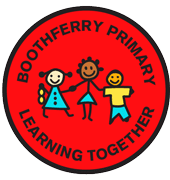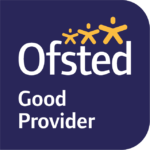Phonics
Aims
The National Curriculum aims for English are:
- Read easily, fluently and with good understanding.
- Develop the habit of reading widely and often, both for pleasure and information.
- Acquire a wide vocabulary, an understanding of grammar and knowledge of linguistic conventions for reading, writing and spoken language.
- Appreciate our rich and varied literary heritage.
- Write clearly, accurately and coherently, adapting language and style in and for a range of contexts, purposes and audiences.
- Use discussion in order to learn; children should be able to elaborate and explain clearly their understanding and ideas.
- Children are competent in the arts of speaking and listening, making formal presentations, demonstrating to others and participating in debate.
To achieve this, at Boothferry Primary School we:
- Ensure a consistent approach, to the teaching of phonics, across the school.
- Ensure that children have direct phonics teaching four times a week, from Reception to Year 2.
- Ensure that children are given opportunities to use and apply their phonics learning.
- Ensure that all children use phonics, as their first approach, when reading and writing.
- Ensure that all children entering KS2 are secure at decoding unfamiliar texts.
Intent
- To create an inclusive, inspired and challenging curriculum, which develops children’s knowledge of phonics, enabling them to become successful readers who develop a life-long love of reading.
- To ensure children in KS1 are given the best opportunity to achieve expected progress or more, in reading.
Implementation
In our school, phonics is taught across EYFS and KS1 as well as in intervention sessions across KS2. In KS1 we do this using the Read Write Inc (RWI) programme of study. This is a scheme, developed by Ruth Miskin, which provides a structured and systematic approach to teaching phonics . It is used by more than a quarter of the UK’s primary schools and is designed to create fluent readers, confident speakers and willing writers. We teach in this way because, research shows that, when phonics is taught in a structured way – starting with the easiest sounds and progressing through to the most complex – it is the most effective way of teaching young children to read. All staff involved in delivering RWI sessions receive the official RWI training to ensure consistency across all groups in school.
According to the Department for Education (2022), ‘almost all children who receive good teaching of phonics, will learn the skills they need to tackle new words’. This allows children to read any kind of text fluently and confidently, and to read for enjoyment.
For support with pronunciation of the RWI phonic sounds, please click on the following link. https://www.youtube.com/watch?v=TkXcabDUg7Q . Phonics provides children with the building blocks needed to become successful readers. Initially, we teach them to recognise the sounds that each individual letter makes, identify the sounds that different combinations of letters make – such as ‘sh’ or ‘oo’ and then blend these sounds together from left to right to make a word. Children can then use this knowledge to ‘de-code’ new words they hear or see.
In KS1 we continue to develop children’s phonics knowledge through the RWI scheme. The children learn Set 2 and Set 3 sounds (see Appendix 1 at bottom of page), which enable them to read and write a range of words. Children learn different written representations of a sound (‘graphemes’), for example ‘ay’, ‘a-e’, ‘ai’. This enables children to become more confident with not only their reading, but also spelling and develops skills which are transferrable to their Literacy. In Year 1 there is a greater emphasis on the reading of the sounds, whereas in Year 2 this progresses by using the correct graphemes more in spelling.
Across EYFS and KS1, children have phonics lessons four times a week. Each session comprises of two parts- a speed sound lesson and a book lesson. The speed sound lesson covers: revision of previous sounds taught, teaching of a new sound, reading words with the new sound in and writing them. The book lesson provides children with the opportunity to apply their new phonic knowledge to a book, giving them a purpose and sense of achievement. During RWI book lessons we work with children to develop their comprehension skills. We do this using a range of strategies such as ‘Fastest finger’ and ‘Have a Think questions’ to engage the children and ensure they enjoy their learning, making it a memorable experience.
Phonics is embedded across the curriculum and the children are encouraged to use phonics to support them in all of their written work. Phonics resources are displayed in each classroom across the school, including the RWI sound chart and tricky red words. The children are encouraged to refer to these when writing in all lessons across the curriculum.
Children in EYFS, Year 1 and 2 are assessed using the RWI assessment every 6 weeks. This identifies the children’s progress in phonics and their next steps. These regular assessments enable us to accurately stream children for RWI, ensuring the teaching they receive is tailored to the level they are at. In addition to this, children in Year 1 are also assessed using a mock ‘Phonics Screening Check’ just before the February half term and Easter holidays. The final Year 1 Phonics Screen takes place in June. The check is designed to confirm whether individual children have learned sufficient phonic decoding and blending skills to an appropriate standard. The test consists of 40 words – it is a combination of 20 real words and 20 pseudo words (nonsense words) for the child to read on a 1:1 basis. This is carried out by a member of staff who has undertaken the Phonics Screening training and who the children are familiar with. Children who do not pass this in Year 1 will be re-assessed in Year 2. The results of this are reported to parents/carers in the summer term.
When children start in Reception class, we invite parents/carers in to a reading and phonics workshop. This workshop supports parents/carers in listening to their child read and practising phonics at home. Children take home RWI Book Bag Books. These are carefully matched to the Storybooks to reinforce classroom learning at home. Reading books are changed on a weekly basis.
We understand that RWI phonics will not work for all children. In this case, children are closely monitored to identify any specific difficulties. We consider alternative strategies to support these children, such as learning to recognise words by sight. Each child is individual, and so we will work collaboratively with the SENDCO, class teacher and Phonics Lead to implement successful reading support.
Impact
- The result of phonics teaching at our school will be that children will have a secure knowledge of phonics, enabling them to become confident readers, making expected progress or more, with a life-long love of reading.
Children will be able to apply their phonic knowledge to confidently spell many words either correctly or phonetically using the sounds they have learnt. They will know spelling alternatives for different sounds and be able to apply these consistently.
Boothferry at Young Voices…..Just WOW! What an experience.”
“I love the fact that senior members of staff know the names of the children.“
“Senior leaders lead by example, modelling what is expected of all staff. Teachers feel valued and respected.”
“The friendly atmosphere, the safe environment & the teachers’ encouragement.”
“Pupils’ personal development and welfare are outstanding. Pupils thrive and are keen to learn. They know how to look after their
wellbeing and how to keep safe. The school is an inclusive and happy place.”
“My children are thriving as the school is committed to learning and progression.“
“We want to thank you for welcoming my family when we moved here (from Bulgaria).”
“The Head teacher and deputy are fab, they join in everything.”
“Being part of their learning – it doesn’t just stay in the classroom.”
“The after school activities, film nights and discos.“
“School leaders are ambitious and highly knowledgeable about teaching and learning.”
“Open weeks in Foundation allows parents to enjoy school as much as our children.“
“The joy of the teachers who greet the children and parents daily.“
“The curriculum is well designed to include a range of exciting themes, visits and visitors to enhance pupils’ learning. Pupils become
confident individuals who are well prepared for the next stage of their education.”
“The best thing about this school, when I ask my child this question, he said Mrs Emmerson. “
“The choice to do a traditional nativity was great !.“
“Pupils who speak English as an additional language make rapid progress. Disadvantaged pupils are also supported well to make good,
and sometimes better, progress in reading, writing and mathematics.”
“Teachers, including those who are new to teaching, have high expectations, and they plan creative lessons that spark pupils’ interest and inspire them to do well.”
“the amount of effort put in by the teachers to make topics interesting is brilliant.“
“Senior leaders lead by example, modelling what is expected of all staff. Teachers feel valued and respected.”
“My children are developing very well in school.“
“..closeness between all age groups and years.“
“the school gives me advice as a parent so I can help my daughter.“
“The headteacher, deputy headteacher and the assistant headteacher make an effective team. They sustain a culture of continuous i improvement through the school’s vision and specific learning goals, which include resilience, morality and adaptability.”
“This school meets our expectations in every way.“
“My son’s teacher is creative, enthusiastic and genuinely cares about him as an individual .“
“Thank you for treating my child like your own.“
“My children have come on and made progress socially and academically since joining.“
“The teaching of phonics is a strength and enables pupils to make rapid improvement in their early literacy skills. ”
“We can only applaud the ingenuity & continued compassion of the young people at Boothferry.”
“Opening the school doors at 8.40am has made it much easier as it is less crowded.“
“You can approach any member of staff and they help you.“
“When ever I have had a problem the staff on the whole have been sympathetic and helpful.“
“The headteacher, senior leaders and governors are ambitious for pupils. Their determination has made Boothferry Primary a flourishing and successful school.”
“School leaders have taken effective action to ensure that pupils make at least good progress from their low starting points in reading,
writing and mathematics in all year groups.”
“Miss Pulleyn is fantastic“
“The stimulating learning environment. “
“The photography club is brilliant, I think introducing things like this is brilliant for the children.“
“I love seeing school events on Twitter.“
“The bike loan scheme.My family also like the school bank.“
“I feel the school has advanced with regards to the appropriate curriculum for different age groups.“
“Leaders and staff have significantly improved the teaching of reading. Pupils are enthusiastic and frequent readers.”
History day was amazing. Brilliant idea.
“Leaders use funding well to ensure that pupils with special educational needs and/or disabilities (SEND) make strong progress from their different starting points.”
“Children get off to a strong start in early years. This is due to effective leadership and skilful teaching. The proportion of children reaching a good level of development is improving yearon-year.”
“My kids love the fruit on the snack table.“


